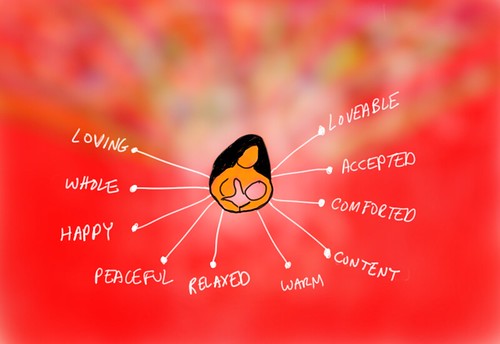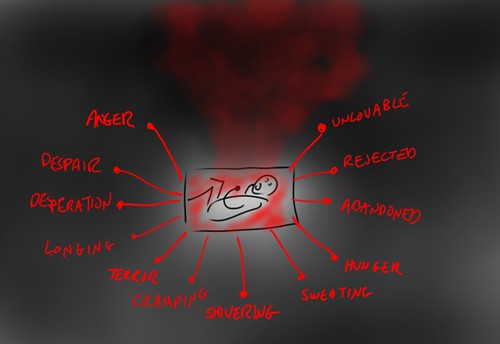Whisky posted her own take on it today. She wrote: “Haters don’t really hate you, they hate themselves; because you’re a reflection of what they wish to be.”
I think that's often true. But I also believe that in most cases, it's a reflection of much deeper and long-standing psychological factors. I wrote about it here in 2008:
 |
| Needs Fulfilled |
 |
| Needs Denied |
Unresolved trauma going all the way to perinatal experiences is walled off, locked away and repressed from memory in linked webs of emotions, thoughts, sensory memory and narratives. The entire ticking time bomb can be ignited when a new experience with a similar charge is experienced. It can be a single aspect, such as the scent of perfume, or a narrative such as "she loves me, now she'll leave me."
Virtual worlds, social networks and online communities seem to intensify and accelerate this process.
Although trolling plays out as an attack on a current target, the intense negative emotion behind the actions has nothing to do with the current situation. It only acts as a trigger. The statements Whiskey called out in her graphic were probably born decades ago in the minds of her attackers. The words are really directed to their mom, dad, grade school rival, ex-wives, etc. Until they wake up and realize that real source of their pain, they're bound to keep repeating their destructive attacks on a chain of innocent bystanders.

14 comments:
Hrm... I've always wondered about the line between critic and troll.
Motivation?
Nature of attack?
Some higher moral standard to judge by?
Not sure.
-ls/cm
The internet is a force multiplier for existing patterns of human behavior. The "troll" has always been here of course - there have always been people who have a need to extract satisfaction from inflicting some form of harm on others even if only verbal abuse.
One data point is that down through the years, many hardened, lifestyle internet trolls have given signs that they're suicide risks. At least one relatively high profile troller did commit suicide a few years ago, citing that "life had become dull" in his last note. (Can't recall his name, at the moment.)
I can offer that several committed trolls and online abusers in some communities I have been a part of, had later been revealed to suffer all the signs of clinical depression, and several of them turned out to have been using drugs like heroin to alter their mood and get by. Whether this is a pattern or not, quite a few troll-like personalities refused to seek professional help and prescription medication, and instead turned to illegal narcotics.
One persons troll is another persons savior.
I'm with Crap, I hope I know the difference between persecution and contradiction. I hope I never wither under genuine critique. (Although my own inner critic is a whole 'nother story.)
So then, the way to deal with a troll is to understand that their behavior is rooted in insecurity, and feel sorry for them? Recommend a good therapist?
I just want everyone to like me, and like what I do. Is that too much to ask?
Crap: In the context of this post, I used the term "troll" to describe someone who repeatedly targets certain people for harassment. Someone whose intent is to discredit, defame, intimidate, wound or otherwise harm. The focus is on attacking the character of the person more than the substance of their work.
To some extent, anything short of substantive criticism falls into this category. Saying "your work sucks and I don't understand why people like it", for example.
It's very possible to be critical without mean-spirited personal attack. There are a number of people who have been pretty scathing in their criticism of some of my ideas, but will engage in reasoned discussion, even if we never see eye to eye.
Space: For sure. Externalizing self-loathing isn't an effective long-term strategy for relief of one's own suffering.
savemeoh: There's no accounting for taste. ;)
Whiskey: Some people hate the Dalai Lama, so it may be asking a bit much.
It's a lot harder to judge when we're the target, because it kicks up our own issues. I don't think I can look into the soul of any particular person and know exactly what's behind their venom. But when people express intense negative emotion because you made a personal blog post that had nothing to do with them, I think that indicates they have some unresolved issue that's triggered.
"Troll" is a much abused term, as is "critic."
Trolling is often done to provoke an revealing reaction or hidden motivation. It's pranksterism.
Criticism is intended to point out both bad and good and doing it well is difficult, for nice people don't care to hurt feelings, while jerks don't care about feelings - and neither leads to useful feedback.
An interesting sidelight: Clinical depression has an unexpected benefit - people with clinical depression tend to evaluate things much more objectively. Where they go from there has much more to do with what sort of person they are than the details of their mental health.
The part that matters is whether or not it's done out of a genuine spirit of caring about either the artist, the art or the community of artists. If it comes from nihilism, it's destructive. But accurate criticism - if it's entirely pleasant, it's not criticism, it's flattery.
Speaking personally, I most often reserve comment in regards to the many eye-bleeding and depressingly banal things I find in SL, for very likely that is the very best those people can do - or they are the sort of people I don't care to help improve the appalling things they do.
For instance, it would not be difficult to give insights that would better evoke the true spirit of Gor, but I would not see that as either interesting or good. I see an social utility in it being an homoerotic tiki swamp filled with sad minimalist presumption perfumed with lonely socks. That is to say - my feeling is that if done well, it will be persuasive that something I disapprove of will be seen in a better light.
And THAT is a point worth considering. Does the criticism or trolling go to motive? It's unwise to presume that first, but it's always worth considering as a possibility.
I suppose the message here, should there be any, is that the complete lack of signal is normal, and it would not be unreasonable for Whiskey Monday to take it as a sign that she is doing something worth tearing down.
I'm not sure what the point of trolling is, other than to gratify the ego of the troll and/or to get sick satisfaction from making someone else feel bad. I just figure that there are a lot of mentally ill people in the world, and far better for them to get their jollies by attacking others over the Internet than, say, blasting away inside a movie theater.
Even well-intentioned criticism can be misplaced. You're entitled to your opinion, but it's not criticism to say, for example, "I think 100 word stories are too short. However 200 word stories, now we're talking."
Honest criticism can hurt, but honest criticism isn't often given (a) by strangers or (b) in public.
DeNovo: I agree that intent is important. Thing is, few of us are very self-aware about why we actually share. I sure don't get in touch with my motivation for every tweet, blog comment, etc.
Rhianon: I'm guessing by "honest" criticism, you mean that the comments are meant as a reasoned critique with a positive intention, rather than just a handy excuse to attack someone. There are plenty of people who say really mean things using excuses like, "I'm only being honest" or "I'm just doing it for your own good."
Trolling is more like just seeing what shit you can stir up. Like showing up in a liberal 'blog and commenting that Obama is a socialist just to watch them flip out.
Abuse directed towards one person is just abuse. It doesn't matter whether you call it 'trolling' or 'griefing' or whatever. If you were on a bus and someone started abusing someone else seemingly at random, you'd be concerned, and you wouldn't contextualize it as 'trolling' or 'criticism.' You'd likely call it 'harassment,' which is a form of violence. You might call it 'bullying' if it were a pattern.
But because of the internet, and our semi-anonymity, we tend to think of these things as existing in some other universe. That's why the bully/troll/griefer/abuser feels safe in the first place. And make no mistake: The abuse comes from a place of safety for the abuser, and makes them feel better. If it didn't, they wouldn't do it.
So the reality is that if you are watching someone do this, you are watching someone get off on hurting other people. And if you get off on that, then you're also broken.
Within the context of Second Life, we have our avatar identities, which can further blur the ethical and moral dimensions. Not everyone has the same level of identification with their avatar, just as not everyone has the same degree of identity perspective in real life. Which is to say, you can't be abusive and then say, "But it's just a little cartoon avatar person I'm abusing, not *you.*" If no one is asking for that kind of ego-cleaving abuse, then it's not deserved.
Basically, discussing the inner life of a troll is about the same as discussing the inner life of a serial killer: It might be interesting, but it can never justify anything.
Because, as I go out on a limb here and say: Abuse and harassment are morally and ethically wrong.
Solo: I agree. I regret using the word "troll" because it ended up clouding the issue I was trying to highlight. Acknowledging the inner world of an abuser is not meant to justify the actions, but to empower us to respond more effectively. I wrote about that a bit more in today's post.
Post a Comment